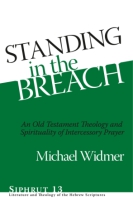
Standing in the Breach
An Old Testament Theology and Spirituality of Intercessory Prayer
Michael Widmer
Standing in the Breach
An Old Testament Theology and Spirituality of Intercessory Prayer
Michael Widmer
At the heart of this study is a biblical-theological approach to central passages on intercessory prayers in the OT. After examining these largely prophetic prayer dialogues, Widmer argues that they provide an important key to biblical theology and spirituality. Furthermore, a close reading of prayers by Abraham, Moses, Samuel, David, Solomon, Isaiah, Jeremiah, Joel, and Amos reveals fascinating insights into the portrayals of these characters and confirms strong conceptual associations with Moses, Israel’s archetypal mediator. Widmer reads these prayers in both their immediate literary and wider canonical contexts. The ultimate aim of this study is to gain a deeper understanding of the God whom the church worships and confesses to be the Father of Jesus Christ.
- Description
- Table of Contents
Particularly pertinent is the finding that many OT prayers interact with God’s nature as revealed to Moses in Exod 34:6–7. Yhwh’s fullest revelation is also given in the context of an intercessory prayer. Widmer argues that intercessory prayer and theology have a hermeneutical-spiral relationship, mutually informing and correcting each other. It is in engaging with a loving and holy God that the phenomenon of divine mutability must be understood. Overall, Standing in the Breach suggests that fundamental biblical themes such as God’s mercy and judgment, divine retribution and forgiveness, covenant mediation, substitutionary suffering and atonement, and eventually the dynamics of the cross are all intrinsically related to and illuminated by prophetic OT intercessory prayers.
Chapter 1. Hermeneutical Reflections
Chapter 2. Abraham: Patriarch and Intercessor (Genesis 18)
Chapter 3. Moses: Israel’s Archetypal Intercessor (Exodus 17, 32–34, Numbers 13–14, Deuteronomy 9–10)
Chapter 4. Samuel: Israel’s Second Legendary Intercessor (1 Samuel 7, 12, 15)
Chapter 5. David: Repentant Sinner, Priestly Intercessor, and Yhwh’s Change of Mind (2 Samuel 24)
Chapter 6. Solomon: Prayer of Dedication (1 Kings 8)
Chapter 7. The Suffering Servant: Substitutionary Atonement through Intercession (Isaiah 53)
Chapter 8. Jeremiah: Agent of Grace and Judgment
Chapter 9. Joel: The People’s Repentance, Priestly Intercession, and God’s Gracious Return (Joel 2)
Chapter 10. Amos: The Logic of Intercessory Prayer (Amos 7)
Chapter 11. Summary of Theological Findings and Some Implications
Bibliography
Index of Authors
Index of Scripture
Mailing List
Subscribe to our mailing list and be notified about new titles, journals and catalogs.



